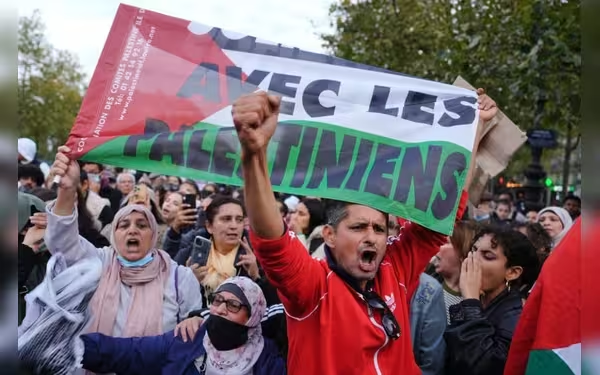Thursday, November 7, 2024 03:26 AM
French Activist Zaiter Sentenced for Glorifying Terrorism
- Zaiter sentenced to three years for social media posts.
- Pro-Palestinian protests in Nice sparked controversy.
- Debate on free speech versus national security intensifies.
 Image Credits: tribune.com.pk
Image Credits: tribune.com.pkFrench activist Zaiter receives three-year prison sentence for glorifying terrorism amid pro-Palestinian protests, raising free speech concerns.
In recent times, the ongoing conflict between Israel and Palestine has sparked intense debates and protests around the world. The situation has led to various reactions, including support for the Palestinian cause. However, in France, a pro-Palestinian activist named Zaiter has faced severe consequences for his actions. He has been sentenced to three years in prison for "glorifying terrorism" through his social media posts. This case has raised questions about freedom of expression and the limits of activism.
Zaiter was known for organizing the first pro-Palestinian protests in Nice in October 2023, coinciding with Israel's military offensive in Gaza. These protests aimed to raise awareness about the plight of Palestinians and to express solidarity with their struggle. However, the French authorities viewed some of Zaiter's online statements as crossing a line, leading to his arrest and subsequent sentencing.
The ruling has sparked a debate in France and beyond about the balance between free speech and national security. Many supporters of Zaiter argue that his actions were a form of political expression, while critics claim that glorifying any form of violence is unacceptable. This case highlights the complexities of activism in a world where social media can amplify voices but also attract scrutiny.
As the situation unfolds, it is essential to consider the implications of such legal actions on activism and public discourse. While it is crucial to condemn any form of terrorism, it is equally important to protect the rights of individuals to express their opinions, especially on sensitive issues like the Israeli-Palestinian conflict. The challenge lies in finding a balance that allows for open dialogue while ensuring that harmful rhetoric does not go unchecked.
Zaiter's case serves as a reminder of the delicate nature of activism in today's world. It raises important questions about how societies navigate the fine line between freedom of expression and the potential for inciting violence. As discussions continue, it is vital for individuals and governments alike to engage in thoughtful conversations about the role of activism and the responsibilities that come with it.













